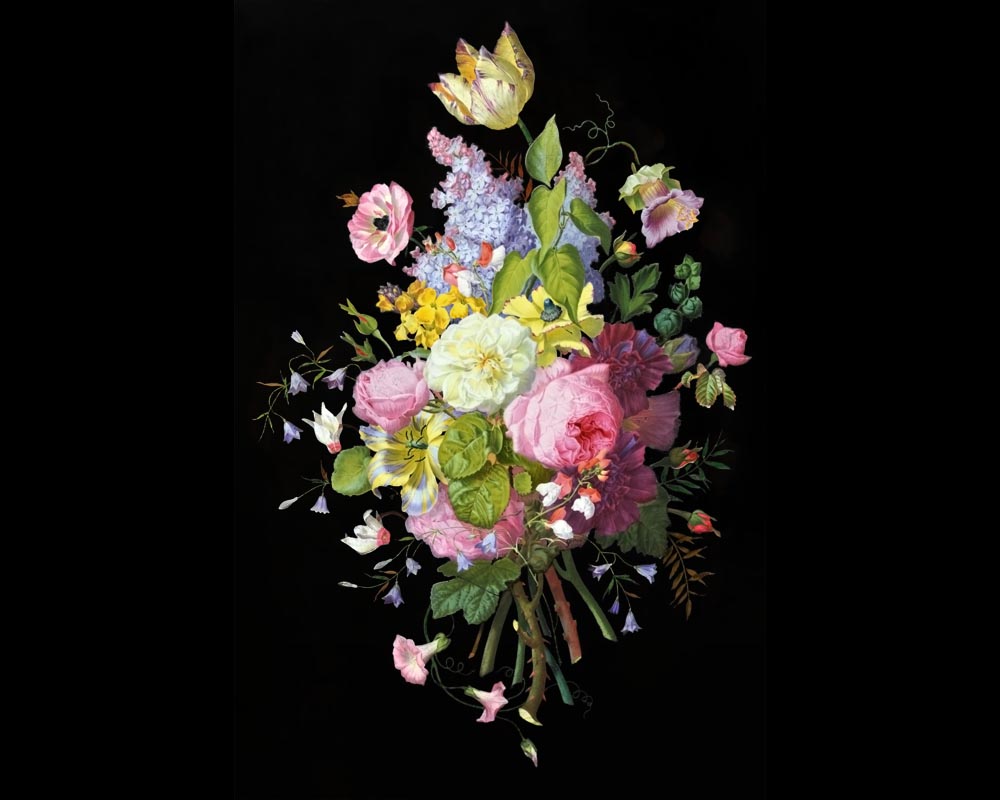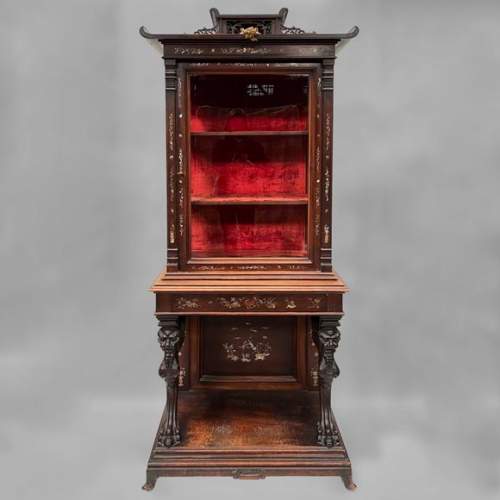Style Napoleon III / Ref.17255
Julien-Nicolas RIVART (1802-1867) and Pierre-Joseph GUEROU - Pair of Side Cabinets decorated of bouquets in porcelain marquetry
Dimensions
Width 35'' ⅜ 90cm
Height 44'' ½ 113cm
Depth: 17'' ⅜ 44cm
Origin:
Signed « Guérou 1854 ».
Status:
Blackened pearwood, mahogany, brass, gilt bronze, porcelain marquetry. In excellent condition.
Masterpieces of Marquetry in the 19th century. Patents. Rivart, Cremer, Fourdinois, Kayser Sohn et Duvinage, Marc Maison et Emmanuelle Arnauld, Ed. Faton, 2012, p. 39 et 40.
Richly decorated in porcelain marquetry and gilt bronze, this pair of side cabinets, made by Julien-Nicolas Rivart , demonstrates the high level of perfection attained by its creator, and may be considered as a master piece of his production. The center of the front panel is decorated with a bouquet of naturalistic flowers contrasting with its delicate colors against the dark background, and raises these furniture pieces to works of great originality. Finding inspiration in the technique of porcelain plaques set into wood panels, and in Florentine mosaics in hard stone, Rivart totally renewed the use of porcelain by inlaying it like real marquetry where each element was independent. As early as 1849, he registered a patent on this process, thus securing the exclusive rights on this type of decoration.
At the various World's Fairs of the time, Rivart displayed his creations which were hailed as a success by both the press and the public. His technique was described by contemporary observers as being "one of the most important innovations in furniture decoration" and opinion was unanimous regarding the charm of these naturalistic flowers. Each of the two side cabinets is decorated in a different way, proof of Rivart 's concern for attaining rich ornamental decoration: purple lilacs, tulips, roses and morning glory on one cabinet, while the other contains white lilacs, peonies, St. John's wort and poppies. Each bouquet ornamenting the central panel is of a rare quality of execution and makes a striking contrast against the black color of the wood. Echoing the motifs used on the doors, the side panels are decorated with gilt bronze vases filled with flowers. The style of the bronze, in the taste of the 18th century, becomes part of this play of color: among the ornaments, one's attention is drawn to the frieze made up of neo-classical water leaves that run all along the central panels as well as egg-and-dart molding on the upper cornice and lower base, just above a gilt bronze mount in the form of a shell, that is inspired by 18th century examples.
Both these side cabinets are signed by Pierre-Joseph Guérou on the inlaid porcelain and are dated 1854, which allows us to place them accurately within the context of their manufacture. A painter at the Sèvres factory, in 1847 and 1848, Guérou worked with Rivart on several occasions, for the painting of different elements the latter wanted to inlay in his furniture. A specialist in flowers painting on porcelain, he participated several times in the Salon between 1836 and 1865. Although his style is easily recognizable, his signature is however only rarely seen. A very few other works signed by him are known today, most notably the jewel cabinet made for the Empress Eugénie, decorated using Rivart 's technique, which is presently conserved at the Chateau of Compiègne, a table preserved in the Murska Sobota Museum in Slovenia, and at last a sumptuous "violin" style desk that the Marc Maison Gallery holds in its collections as well.
This pair of side cabinets is hence one of the only known works bearing Pierre-Joseph Guérou 's signature. Its presence, an extremely rare fact, underscores the exceptional character of these pieces and attests to the virtuoso production that attained "perfection in the execution of cut and inlaid porcelain plaques" (Report of the jury of the Universal Exhibition of 1855).
Informations
Price: on request
Recommended for you :
Dimensions:
Width: 84
Height: 186
Depth: 49
Dimensions:
Width: 75
Height: 158
Depth: 47
Dimensions:
Width: 110
Height: 205
Depth: 48
Dimensions:
Width: 124
Height: 148
Depth: 47
Dimensions:
Width: 128
Height: 218
Depth: 44
Dimensions:
Width: 107
Height: 211
Depth: 47
Dimensions:
Width: 53
Height: 138
Depth: 34
Dimensions:
Width: 98
Height: 204
Depth: 43
Dimensions:
Width: 390
Height: 125
Depth: 65
Dimensions:
Width: 258
Height: 85
Depth: 144
Dimensions:
Width: 85
Height: 150
Depth: 43
Dimensions:
Width: 110
Height: 173
Depth: 44























